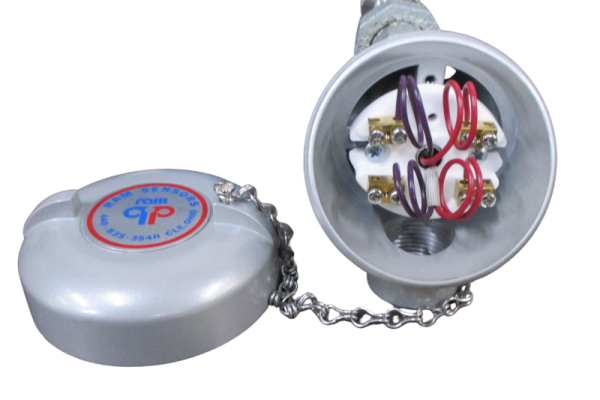Toll Free: (800) 888-8987 | Phone: (440) 835-3540 | office@ramsensors.com
Thermowells
Thermowells are cylindrical, tube-like fittings that feature one closed end and another that is mounted in the process stream. They are typically crafted from solid, drilled-out bar stock. Used with various temperature sensing devices, thermowells are designed to encase and protect a temperature sensor from flow, high pressure, harsh environments, and industrial processes while not influencing its ability to accurately sense temperature. They protect instruments, can extend the life of a temperature sensor, and allow for easy calibration or replacement.
Because of their tailored construction, thermowells have wide application in many fields, including:
- Petrochemical
- Power
- Chemical
- Oil refining
- Storage
- Food and dairy
- Biotechnology
- Pharmaceutical
- Cosmetics
Thermowells are typically classified based on their connection points. The four most common types are: (1) threaded, (2) socket weld, (3) weld-in, (4) flanged, and (5) sanitary. The use of standardized thermowells permits simple relocation of sensors throughout a facility.
Threaded. The thermowell is screwed directly into a pipe or into a threadolet and is crafted with stepped construction, increasing speed of response but maintaining mechanical integrity.
Socket Weld. These thermowells are welded directly into a pipe wall or into a weldolet socket.
Weld-in. This type of thermowell is welded directly into the process vessel or piping, so corrosion resistance is vital.
Flanged. Whether raised face, flat face, or ring joint flanged, this type of thermowell is attached via a mating flange on the pipe nozzle.
Sanitary. This type of thermowell is designed to be either welded into a tank or vat or connected using a tri-clamp connection to prevent corrosion, bacteria growth, and product contamination.
All thermowells are available as separate components or as part of complete sensor assemblies. They can be constructed of a variety of materials which can each affect performance and longevity of the device. The type of chemical, flow rate, and temperature to which the thermowell will be exposed are key deciding factors. They are also available in various levels of strength and with varying tips, depending on the desired application and system configuration.
Thermowell material options are:
- Stainless steel – corrosion-resistant
- Carbon steel – best for low pressure and temperature
- Molybdenum/ chromium steels – good for pressurized vessels
- Titanium
- Copper
- Ceramic
- Wrought iron
- Inconel®
- Haynes® Alloy – carburizing, sulphide, and chlorine-filled environments
- Monel®
- Incoloy®
- Hastelloy®
Immersion length is another factor to consider, with a longer insertion point being preferred for the most accurate temperature sensing. Vibration is also important, as excessive vibration can cause thermowell failure. Choosing a thermowell crafted of a material that is stiff and strong enough for the testing conditions is key.
You Can Trust RAM
RAM Sensors, Inc. provides thermowells that have a proven track record in a wide range of industries and applications. We know that it’s vital that you have access to quality products from a reliable source––your business depends on it. Our varied product line offers thermowells from industry-leading brands and are available as separate components or as a part of complete temperature sensor assemblies.
If you’re in need of explanation or help in choosing the best thermowell for your unique application, please feel free to contact us. We are ready to help you find the ideal solution for your temperature sensing needs.





